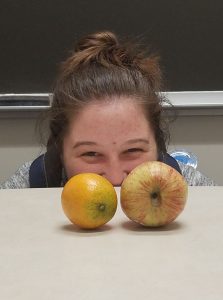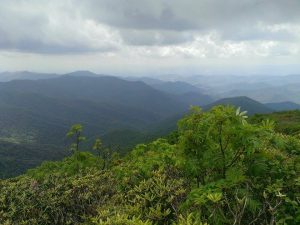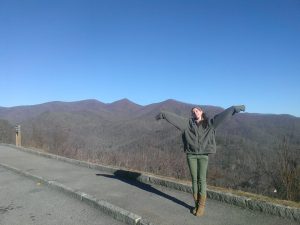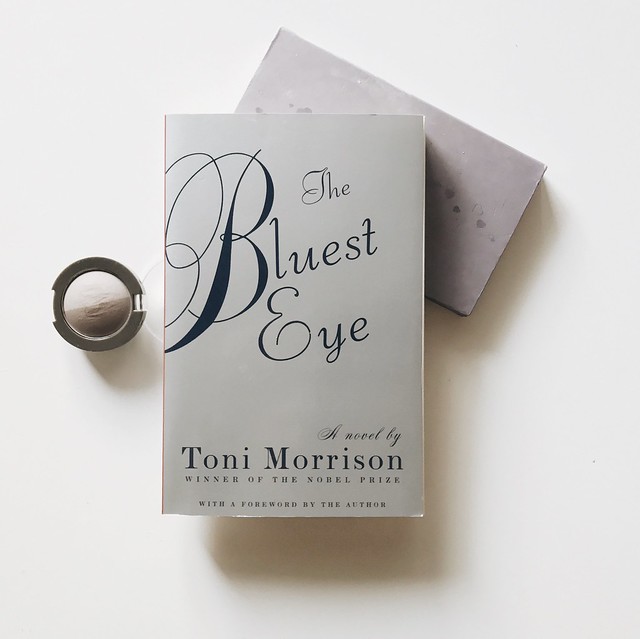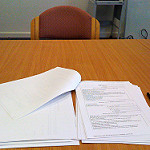I have had quite the exciting April this year. I got to meet two Native American authors who I greatly admire. I’ve also been busy with finishing up final papers and projects for my second to last semester before graduating!
But before I give details on those encounters, I’ll dive into my experience with peer reviewing SUNY Genesco’s website:
I think Liz and Sean did an excellent job with creating and putting together the website. I love the rainbow background. I was a little nervous that it might be a bit difficult for me to read, but the text was dark enough to where I could make everything out without any issues. I read as much of the actual content as I could. I thought it was super interesting. I had never heard of Rainbow Boys before I took this class, so it was a new learning experience for me.
My only concerns that I recall having is that I found some typos in one of the timelines. And it was a little difficult for me to see that some text was hyperlinked since the hyperlinks were so close to the color of the regular text.
My favorite part of the website was the video where Alex Sanchez talks about his experience as a homosexual man and writer. I thought it fit so well with the content of the interview transcription above the video. It was a perfect touch in my mind.
I think that one good addition to the site might be some excerpts from the book that Liz and Sean may think have been challenged. It also would have been nice to see more photos to compliment the interview transcriptions and some of the text. Though I wonder if they were minimalist with extra media because of the rainbow background.
On that note, one page that I saw on Sean and Liz’s website that I think would be a good addition to my and Rosanna’s website is a page that lists what we know about the parent who challenged the book. Even though we didn’t get to interview the parent, I think it would be useful to have one page dedicated to listing all that we unearthed about him so that viewers can have that context.
It was really cool to go through the website. It not only made me think about this particular case of censorship, but the evolution of LGBTQ literature throughout history. I think that we have come a long way. Though we still have more ways to go in that literary arena.
Now I’ll jump to my interactions with Annette Clapsaddle and Joy Harjo.
A little background on Annette:
She is an author and journalist who is both local and native to western North Carolina. Annette is an enrolled member of the Eastern Band of Cherokee Indians who grew up in Cherokee, North Carolina. She currently resides in Qualla, North Carolina with her husband and children. She earned her bachelor’s in American Studies and Secondary English from Yale University and her master’s degree in American Studies from the College of William and Mary. Her first novel, Going to Water, whose main character is loosely based on her grandfather, the late former Principal Chief Osley Saunooke, is the winner of the Morning Star Award for Creative Writing from the Native American Literature Symposium, a finalist for the PEN/Bellweather Prize for Socially Engaged Fiction, and the 2017-2018 selection for Western Carolina University’s One Book program. When she was the assistant to the former Principal Chief Michell Hicks, Annette produced Cherokee Elders: Our Greatest Generation and a series of children’s books including: The Elder Tree, True Blue, and What Wonders. Her recent publications also include “Undertow” in Carolina Mountain Literary Festival Anthology: Ten Years of Festivals, Naked Came the Leaf Peeper, “It All Comes Out in the Wash” from Appalachian Heritage Quarterly, and “Camouflage” from Night is Gone, Day is Still Coming. After she served as the executive director of the Cherokee Preservation Foundation, Annette returned to teaching English at Swain County High School. She has been National Board Certified since 2012. She is coeditor of the Journal of Cherokee Studies and has written bimonthly columns for Smoky Mountain Living magazine.
I got to introduce Annette at Western Carolina University’s annual spring Literary Festival this year. I didn’t get to speak with her much. I wanted to give her some space while she prepped for her talk and had to run out after her presentation was over to make my long trek back home, but I did get a lot out of her presentation and the little bit that I got to converse with her.
One thing that Annette stressed during her presentation was how being a Native American writer is inherently political. Native writers have the power to shape how the world perceives us. However, we also have the burden of dealing with an industry that tends to not understand our people and that sometimes requests that we portray our people in a stereotypical light. For example, Annette described how she has sometimes been asked to write fiction set during the Trail of Tears and how she doesn’t give in to that. While the Trail of Tears is a big historical event for our people, she does not think it should fully define who we are.
Again, it makes me think about the day that my class discussed the lack of Native voices in literature and some obstacles that Native writers might face. What we want to share may not always be what publishers are interested in. And I think that this really stems from stereotypes that certain individuals buy into. In my own experience, sometimes it feels like people don’t want anymore than what they’ve been told. And, in my mind, that kind of defeats the purpose of diversifying the literary canon with more Native voices. We don’t all share a single story. Our tribes and experiences are varied and rich.
After the festival, I was invited to attend a Q&A session with Joy Harjo. Here is some quick background information about her from the Poetry Foundation:
Joy Harjo was born in Tulsa, Oklahoma, and is a member of the Muscogee (Creek) Nation. She earned her BA from the University of New Mexico and MFA from the Iowa Writer’s Workshop.Harjo draws on First Nation storytelling and histories, as well as feminist and social justice poetic traditions, and frequently incorporates indigenous myths, symbols, and values into her writing. Her poetry inhabits landscapes—the Southwest, Southeast, but also Alaska and Hawaii—and centers around the need for remembrance and transcendence. […]Her work is often autobiographical, informed by the natural world, and above all preoccupied with survival and the limitations of language. A critically-acclaimed poet, Harjo’s many honors include the Lifetime Achievement Award from the Native Writers Circle of the Americas, the Josephine Miles Poetry Award, the Wallace Stevens Award from the Academy of American Poets, the William Carlos Williams Award from the Poetry Society of America, and the American Indian Distinguished Achievement in the Arts Award. She has received fellowships from the Arizona Commission on the Arts, the National Endowment for the Arts, the Rasmuson Foundation, and the Witter Bynner Foundation. In 2017 she was awarded the Ruth Lilly Prize in Poetry. In addition to writing poetry, Harjo is a noted teacher, saxophonist, and vocalist. She performed for many years with her band, Poetic Justice, and currently tours with Arrow Dynamics. She has released four albums of original music, including Red Dreams, A Trail Beyond Tears (2010), and won a Native American Music Award for Best Female Artist of the Year in 2009. She has been performing her one-woman show, Wings of Night Sky, Wings of Morning Light, since 2009 and is currently at work on a musical play, We Were There When Jazz Was Invented.
One major takeaway that I got from the session with Joy was her own self-censorship. At one point, she said, “I don’t want to write anything to cause harm. Words can really hurt somebody.” Towards the end of the session, I had a chance to ask her a question. “Do you think that there are some things that are too sacred to write about?” I didn’t get to write everything from her reply, but she essentially said that she thought so. What I gathered is that there are some things in our lives that are too intimate and sanctified to share with the world in our literature.
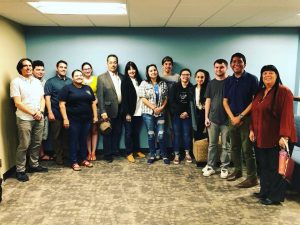
UNC Asheville’s Native American Student Association with Joy Harjo. (I’m the fifth person from the left side.)
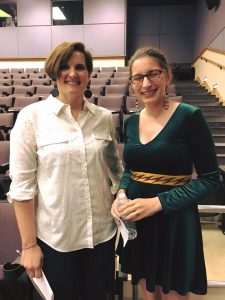
That’s me with Annette Clapsaddle at Western Carolina University’s Spring 2018 Literary Festival.
